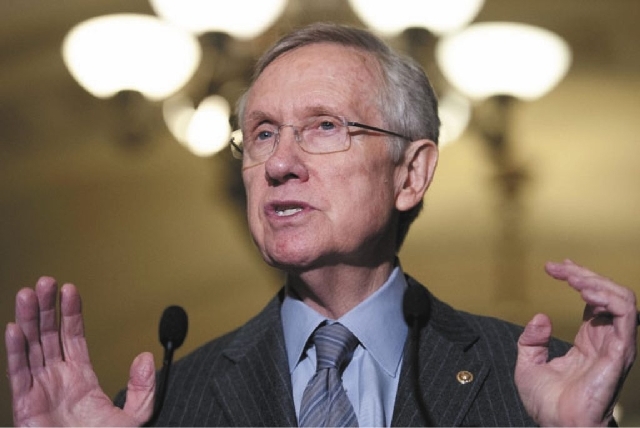Reid wins the day, at least for now

In Washington, there is no tomorrow or yesterday, only today, right now, this exact moment.
What a person said in the last decade, the last week, even the last 24 hours is forgotten, and what you will have to say in the next week or month or year is irrelevant. Only now matters.
And Senate Majority Leader Harry Reid is the king of the now.
Yes, Democrats threatened to filibuster the nominations of executive branch officials under President George W. Bush, four in all. But that was yesterday. Today, Republican threats to filibuster President Barack Obama’s executive branch nominees is enough for Reid to call for the “nuclear option,” removing the threat of filibuster entirely.
But there are no more ardent believers in Ralph Waldo Emerson’s axiom that “a foolish consistency is the hobgoblin of little minds, adored by little statesmen and philosophers and divines” than politicians. And Reid is no little statesman.
The majority leader threatened to change the rules of the Senate, such that Republicans would not be able to threaten to filibuster executive-branch nominees. (The threat would not have applied to legislation or judicial nominations, which Democrats also filibustered when they were in the minority.)
Republicans accused Democrats of breaking the rules. They accused Democrats, especially Reid, of hypocrisy. (Reid did complain loudly when then-Majority Leader Bill Frist threatened to use the nuclear option, although that was over judicial nominations, which are lifetime appointments.) They warned Democrats would regret it.
Minority Leader Mitch McConnell suggested Reid could be the worst leader in Senate history. They even threatened, if they ever again come to power, to change the rules to force Yucca Mountain on Nevada by simple majority vote.
But Reid didn’t waver.
The Senate held a rare, closed-door caucus Monday night, groping for a solution to the standoff. But no deal was reached, and Reid’s deadline — to hold votes on a list of presidential nominees or to change the rules — came on Tuesday morning. It appeared Reid was going to turn the nuclear key.
But then Republicans blinked, agreeing to allow votes on several disputed Obama nominees without threat of filibuster, and promising swift votes on a new set of nominees to the National Labor Relations Board.
Not only that, but Reid rejected a condition that he drop for good the threat of the nuclear option. So, all of this can, and will, happen again, on some future day, the past forgotten, the future abjured.
Although the shifting politics offend, the result of Reid’s gambit is worthwhile. As the senator himself said to reporters on Tuesday, “Qualified executive nominees must not be blocked on procedural supermajority votes,” adding, “so we know that presidents, Democrat and Republican, deserve an up-or-down vote.”
Amen, senator.
The result is also good because it points to a serious problem with Republican opposition: The GOP does not object to the president’s nominees; the party’s senators object to the agencies they are tapped to lead. Such was U.S. Sen. Dean Heller’s objection to Richard Cordray, who will become head of the Consumer Financial Protection Bureau. Heller’s spokeswoman said in a statement that the bureau was not accountable or transparent enough, and that it lent bureaucrats “unprecedented power and control.” Republican suggestions for changes have been rebuffed, she said.
That’s potent justification to bring a bill to change the agency, but not to threaten to filibuster its director until your demands are met. The former is democracy, the latter anarchy.
Reid’s gambit has preserved the Senate’s traditions and repaired its broken wheels, at least for a short time.
But in Washington, where there is no tomorrow, and no yesterday, that may be all we can hope for.
Steve Sebelius is a Las Vegas Review-Journal political columnist, and author of the blog SlashPolitics.com. Follow him on Twitter (@SteveSebelius) or reach him at (702) 387-5276 or ssebelius@ reviewjournal.com.